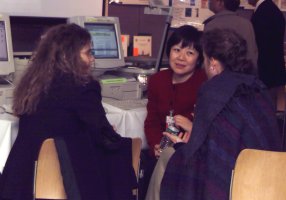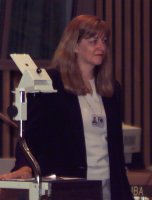| |
|
|
William
Mankin, Global Forest Policy Project, gave an overview of
the Review process, which included a steering committee, country
selection process and case studies, a questionnaire, government
responses, and a draft report, comment and review process. He
highlighted, in particular, the fact that countries' views and
comments were expressed and included in the report.
For full
text of the report "Keeping the Promise?" and country
studies, visit www.forstpolicy.org
|
|
Hans
Verolme, Bionet, discussed
the key findings of the report. He said National Forest Programmes
have been promoted as the solution to world's forest problems.
He highlighted underlying causes of forest loss and degradation,
and said many do not perceive forest loss to be a problem. He hoped
for a move from data collection to using data and changing management
practices. He was disappointed that no one had adequately reviewed
and implemented the Proposals for Action. He said criteria and indicators
is a tool for sustainable forest management and called for taking
cross-sectoral approaches more seriously.
|
|
|
|
Simone
Lovera, Sobrevivencia, discussed recommendations,
including direct political leadership, formal mechanisms, clear
procedures and timetables, interagency coordination, comparison
of existing programs, formal gap analyses, and dialogues to identify
underlying causes. She discussed the new UN Forum on Forests and
emphasized that it will focus on implementation.
|
|
A UNEP Web Forum for Sustainable Agri-Food Production and
Consumption
The
Sustainable Agri-Food Production and Consumption Forum provides
a network of key information sources on agri-food production and
consumption, related environmental impacts and practices to prevent
or respond to these impacts. It will also provide a discussion forum
on technical issues. Information on the following issues can be
accessed: agro-biodiversity; water; energy; climate change; chemicals;
desertification; consumption; trade; and poverty. Overall, the Forum
aims to: build a network linking key information sources; raise
awareness about the link between the environment and the agri-food
sector; provide information on good practices and the efforts of
different actors from the agri-food sector; and facilitate discussion.
Visit www.agrifood-forum.net
|
 |
 |
| Access and Benefit-Sharing: Building Equitable
Partnerships Between Local Communities and International Corporations?
This side-event, organized by UNED
Forum and Novartis International was a follow-up of a workshop on
Bioprospecting and Benefit-Sharing (April 1999) where a
multi-stakeholder forum discussed case-studies. The report
from this forum is publicly available in PDF format at http://wwww.uned-uk.org/.
The panel consisted of
representatives from the public-sector, the international community,
private international corporations, developing country perspectives,
and the indigenous community. Discussion covered various topics
related to building equitable partnerships. Adam Delany
of the Permanent Mission of Papua-New Guinea (PNG) to the UN,
discussed joint ventures and multi-partite arrangements among the
public sector, private industry and local communities in PNG. Micael
Olsson of the Education Development Centre discussed specific
mediation and negotiation methods that businesses, communities and
governments can use to facilitate greater participation and
knowledge-sharing for mutual benefit. Alejandro Argumedo
discussed exploitative practices of industrial patenting of local
knowledge in Peru without prior-informed consent. Answering to
the option whereby indigenous communities engage in corporate
battles, Argumedo explained how competitive participation (with
international corporations in legal and scientific arenas) runs
contrary to local community concepts and knowledge sharing
practices, and would thereby compromise some indigenous belief
systems. With respect to recent developments in (and much talk
of future) MEAs (such as the CBD's Biosafety Protocol, and the UN-FCCC),
and the push for multi-lateral investment schemes, Dorothy Gordon
and Andreas Seiter agreed in the likelihood of private
industry shying away from support as international policy becomes
more complicated.
|
| Photo
: (left
to right) Adam Delany, Permanent Mission of PNG to the UN (Papua-New
Guinea), Micael Olsson, Education Development Center (USA); Andreas
Seiter, Novartis International (Switzerland); Margaret
Brusasco-MacKenzie, Vice Chair UNED Forum (UK); Dorothy Gordon,
Integrated Resource Group (Ghana); and Alejandro Argumedo,
Indigenous Peoples Biodiversity Network (Peru).
|
|
Dorothy
Gordon, Integrated Resource Group, Ghana
|
|
|
|
Alejandro
Argumedo (right), Indigenous Peoples Biodiversity Network
(Peru) stressed the value behind prior-informed consent,
intellectual-property rights as they pertain to traditional
knowledge, and side-stepping exploitation and expropriative
patenting with benefit-sharing.
|
|
Andreas
Seiter, Novartis International (Switzerland) discussed
Novartis' direct operations with local indigenous communities, and
joint ventures with the public sector to take advantage of
multi-stakeholder partnerships which bring breadth of knowledge
and access.
|
|
Is the Aarhus Convention a guarantee for environment and
democracy?
This
side event was organized by the Environment Liaison Center International,
Kenya, and the Norwegian Forum for Environment and Development.
The Aarhus Convention is "the Convention on Access to Information,
Public Participation in Decision Making and Access to Justice
in Environmental Matters. "An increasing number of NGOs and
other representatives from major groups have become increasingly
interested in attempts to globalize this Convention, despite some
resistance from governments". Four basic principles are emphasized
in this Convention: the Right to a healthy environment; the Right
to know; the Right to participate; and the Right to access to
justice. The Convention, when used, will improve the rights of
the public to participate in the making and implementation of
environmental policy. The Convention, when ratified, is an agreement
among countries to open up government to the people in environmental
matters. Panelists included: John Hontelez, who gave a brief introduction
to the Aarhus Convention; Ms. Motlova, Czech Republic, who explained
the importance of Aarhus and how it works; and Ms. Samuelsen,
Danish Ministry of Environment and Development, who discussed
"Governments, NGOs and the Convention--mutually challenging,
mutually beneficial?"
|
 |
Barbara
Gemmil, Environment Liason Center International, Kenya
John Hontelez
provided a short introduction to the Aarhus Convention
|
|

 ENB
Summary of Ad Hoc Open-Ended Intergovernmental Group of Experts on Energy
and Sustainable Development ENB
Summary of Ad Hoc Open-Ended Intergovernmental Group of Experts on Energy
and Sustainable Development
 CSD-8
Intersessionals CSD-8
Intersessionals
 Linkages
CSD page Linkages
CSD page
 UN
- CSD website with official
documents UN
- CSD website with official
documents
 ENB's
"Introduction to CSD" ENB's
"Introduction to CSD"

|